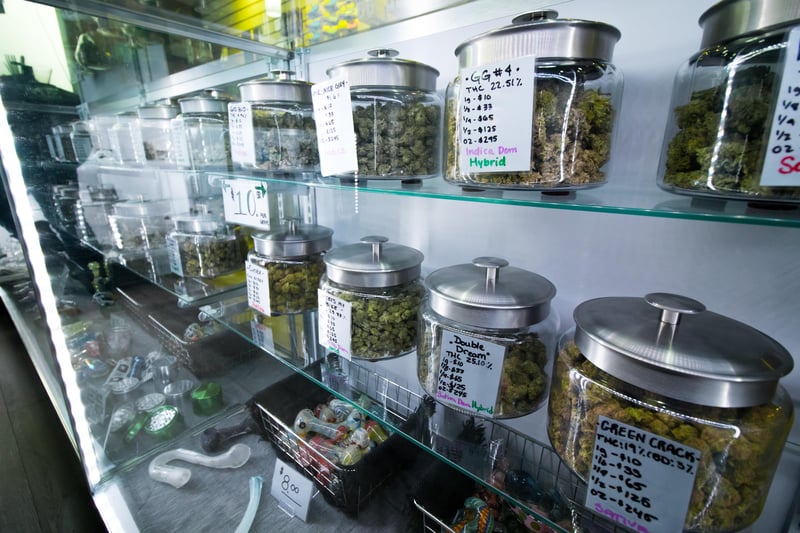Get Healthy!

- Posted July 5, 2023
Access to Medical Marijuana Won't Lower Use of Opioid Painkillers: Study
Medical marijuana is touted as a pain reliever, but in U.S. states where it's legal, prescriptions for opioid or non-opioid painkillers haven't decreased, a new study finds.
According to researchers, this means that people aren't switching to cannabis for pain relief in huge numbers even when it's legally available, so it's unlikely to ease the nation's opioid overdose epidemic.
"Medical cannabis laws had no effects on pain treatment writ large," said lead researcher Beth McGinty, a health policy expert at Weill Cornell Medicine in New York City.
"Medical cannabis laws have been touted by some proponents as a potential solution to the opioid crisis or part of a potential solution to the opioid crisis," she said.
"If we make cannabis accessible, people will perhaps choose to use cannabis rather than prescription opioids for their pain, and that could help reduce our critical overdose crisis," McGinty said. "But our study suggests that that is not the case."
One reason might be that doctors are reluctant to prescribe marijuana for pain, she noted.
"We know from physicians' surveys that many physicians are reluctant to recommend cannabis," McGinty said. "They can't prescribe it technically, because cannabis is still a controlled substance under federal law."
Several other hurdles exist as well.
In most states where medical marijuana is legal, patients have to see doctors who are approved by the state program to prescribe pot, she explained.
Another barrier is that health insurance companies don't cover marijuana, so patients have to pay for it out-of-pocket, McGinty said. Moreover, it has to be a cash purchase as marijuana dispensaries don't take credit cards.
One expert said the lack of insurance coverage for medical marijuana is a major barrier to its use for pain relief.
Many more people would use cannabis for pain "if most doctors were actually helpful and understood and helped facilitate this process and if health insurance actually paid for the cannabis," said Dr. Peter Grinspoon, a cannabis specialist at Massachusetts General Hospital and Harvard Medical School, in Boston.
"I recently had a patient whom I successfully transitioned off of both opioids and (benzodiazepines) to cannabis, and who was doing a lot better in all regards, but the weed was costing him $150 per month and the Percocet (oxycodone) and valium were each only $1 a month, so he was forced to switch back," Grinspoon said.
Medical marijuana is legal in 38 states and the District of Columbia, according to the National Conference of State Legislatures. McGinty's team looked at the use of medical marijuana three years after the law was implemented in 12 states, comparing them with 17 states where medical marijuana was illegal.
The researchers found that medical marijuana laws led to a "negligible" difference in the number of patients receiving any prescription pain medication or chronic pain procedure.
"I'm a cannabis clinician, I practice palliative oncology. I use cannabis specifically for cancer patients, but over the years I have had non-cancer pain patients come through," said Dr. Diana Martins-Welch, a palliative medicine specialist at Northwell Health in New Hyde Park, N.Y.
Martins-Welch said marijuana can relieve pain for some patients, but not all.
"It's not for everybody," she said. "There's so many different types of pain. So for people with pain like fibromyalgia or neuropathy, it may do better than for people who have chronic back pain due to spinal issues."
Regarding the study findings, Martins-Welch said people may have tried marijuana and not found relief so they went back to other drugs. Also, medical marijuana use is not widely advertised so many patients don't know it's available and thus may not have considered trying it, she said.
Martins-Welch noted that Marinol (dronabinol) is a U.S. Food and Drug Administration-approved medication that contains synthetic THC, the active ingredient in marijuana, but it may not be as effective as marijuana itself.
"I always tell patients when I prescribe it that it's not marijuana, it's not from the plants, it's a synthetic version of THC," she said. "I use it for many patients who really cannot afford or cannot access cannabis or don't wish to go to a special place to buy their medicine."
Head-to-head studies are needed to test if marijuana is as effective for pain relief as other drugs, Martins-Welch said. All of the current data is gleaned from observational studies, she noted.
Until cannabis is made legal on the federal level, "we're not going to have robust data to prove that it actually helps people or certain types of pain," Martins-Welch said.
The report was published July 4 in the Annals of Internal Medicine.
More information
Harvard University has more on medical marijuana.
SOURCES: Beth McGinty, PhD, chief, division of health policy and economics, department of population health sciences, Weill Cornell Medicine, New York City; Diana Martins-Welch, MD, palliative medicine specialist, Northwell Health, New Hyde Park, N.Y.; Peter Grinspoon, MD, cannabis specialist, Massachusetts General Hospital and Harvard Medical School, Boston; Annals of Internal Medicine, July 4, 2023





